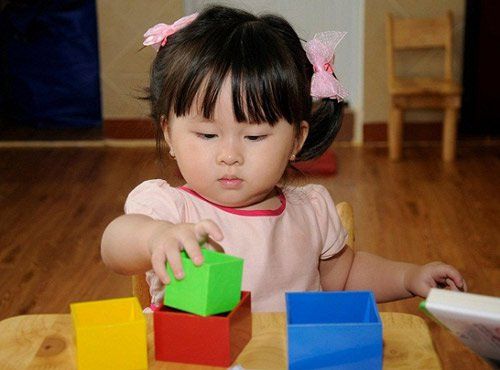This is an automatically translated article.
The article was professionally consulted by Specialist Doctor II Le Thanh Cam - Department of Pediatrics - Neonatology - Vinmec Danang International General Hospital.Children 30 months old have outstanding physical and mental development. To meet the developmental needs of children, parents need to pay special attention to nutrition and take care of their teeth to prevent tooth decay.
1. Development of 30-month-old children
Children 30 months old have outstanding physical and mental development. Children can control their movements well, such as jumping up and down with both feet, going down stairs by alternating legs, running while avoiding obstacles. Children can brush their own teeth with adult help, know how to wash and wipe their hands. Children also perform some fine motor skills such as simple cutting, folding papers, doodles, and arranging blocks.30-month-old baby can correctly name objects, imitate the actions of parents. Children pronounce more clearly, combine more words to form sentences. When the parent speaks, the baby will look at the mouth and try to imitate the pronunciation and facial expressions of the parent. The baby's brain is constantly observing and absorbing all the interactions, things, and events around. No minute is wasted at this age.
To meet the needs of the baby's physical and intellectual development, the 30-month-old child's nutrition needs special attention from parents. Children need to eat a variety of foods to be fully provided with essential nutrients such as starch, protein, fat, vitamins and minerals. Besides, taking good care of children's teeth to avoid the risk of tooth decay and other oral diseases is also very important.

Trẻ 30 tháng tuổi có sự phát triển vượt trội về thể chất và tinh thần
2. Menu for 30-month-old babies
The menu for a 30-month-old child needs to be diverse, the dishes need to be changed regularly to give the child a sense of appetite, to prevent the child from anorexia and fear of certain foods due to eating too much or involuntarily. customary. The daily food intake of 30-month-old children should ensure 150-200g of rice; 150-200g green vegetables; 120-150g shrimp, fish divided into 4 meals; 10g meat each meal. The amount of milk needed to provide children each day is from 400-500ml.Children 30 months old need to eat 3 main meals a day including breakfast, lunch and dinner. In addition, it is necessary to supplement children with 2 snacks in the middle of the morning and in the afternoon. Parents can refer to the menu for children 30 months old as follows:
Breakfast: nutrients for breakfast will usually account for about 25% of the food for the whole day. Children's breakfast menu can be:
Bread (1⁄2 pieces) + cow's milk (soy milk) 200-25ml Meat porridge (1 small bowl) + 1 banana and pepper Fish noodles, meat vermicelli (1 bowl) small) + 200g papaya Lunch makes up about 35% of the child's whole day food. Some menus for 30-month-old babies for lunch parents can refer to:
Rice (2 small bowls) + beans, meat, steamed or fried eggs + spinach soup + banana pepper (1 fruit). Rice (2 small bowls) + meatballs in tomato sauce + spinach soup cooked with lean meat + 1 sweet tangerine Rice (2 small bowls) + fish in tomato sauce + cabbage soup cooked with shrimp + ripe mango (200g) Dinner accounted for 30 % of food for the whole day. Some dinner menus for children such as:
Rice (2 small bowls) + stir-fried beef with bean sprouts + boiled spinach soup + sapodilla (1 fruit) Rice (2 small bowls) + minced pork shoulder with fish sauce + Cabbage soup cooked with fish + banana pepper (1 fruit). Rice (2 small bowls) + egg with tomato sauce + vegetable crab soup + sweet tangerine (1 fruit) Two side meals also account for 10% of the child's daily food intake. During the snack, parents can give the child fresh milk, soy milk, yogurt, jelly, flan,...
How many kg is the 30-month-old baby? In a 30-month-old boy, the average weight of the child is 13.3kg; in girls is 12.7 kg. If the baby has a lower weight than the average weight, parents need to increase nutrition for the baby to keep up with the growth momentum.
Some notes for parents when feeding babies are:
Give children the right meals, enough food, no snacks, sweets before meals. Teach children not to be prejudiced against certain foods. Give your child enough water to drink. Create a happy atmosphere when eating, praise when children finish their meal. Children's meals during the day should be spaced 2-3 hours apart, if they eat too close to the time, they will feel full and do not want to eat.

Cha mẹ cần cho trẻ ăn đúng bữa, ăn đủ, không ăn vặt, bánh kẹo ngọt trước bữa ăn
3. Dental care for 30-month-old babies
Tooth decay is a very common oral disease in children. Tooth decay in children can cause many dangerous complications to oral health and affect the process of permanent teeth later on. According to statistics of the National Institute of Odonto-Stomatology, the number of Vietnamese children suffering from tooth decay tends to increase, the main cause of this phenomenon is because children do not have proper oral care.To prevent tooth decay and other oral diseases in children, parents need to let their children brush their teeth twice a day, each brushing lasts at least 2 minutes. Parents can continue to brush their children's teeth or teach them to brush their own teeth under the supervision of their parents. Pay attention to choose a toothbrush that is comfortable, fits well, can brush all tooth surfaces. Children's toothpaste needs to have the right amount of fluoride and a flavor children love to get them excited about brushing their teeth. In addition, parents need to combine with flossing to help prevent the formation of plaque in the children's teeth.
Teach children the habit of drinking water after each meal. Limiting children to eat cakes, sweets, carbonated soft drinks, ... because these are foods that create conditions for oral bacteria to develop. Children should not eat or drink (except drinking water) after brushing their teeth in the evening.

Để phòng ngừa sâu răng và các bệnh răng miệng khác ở trẻ, cha mẹ cần cho trẻ đánh răng 2 lần mỗi ngày
In addition, parents should also apply some methods of changing habits and improving nutrition to support the child's teeth to develop better.
Besides, parents also need to supplement their children with essential micro-minerals such as zinc, lysine, chromium, selenium, vitamin B1, ... to fully meet the nutritional needs of children. The addition of these essential vitamins also supports digestion, enhances nutrient absorption, improves anorexia, and helps children eat well. Parents can simultaneously apply dietary supplements and functional foods derived from nature for easy absorption. The most important thing is that improving your baby's symptoms often takes a long time. Combining many types of functional foods at the same time or changing many types in a short time can make the baby's digestive system unable to adapt and completely not good. Therefore, parents must be really patient with their children and regularly visit the website vimec.com to update useful baby care information.














